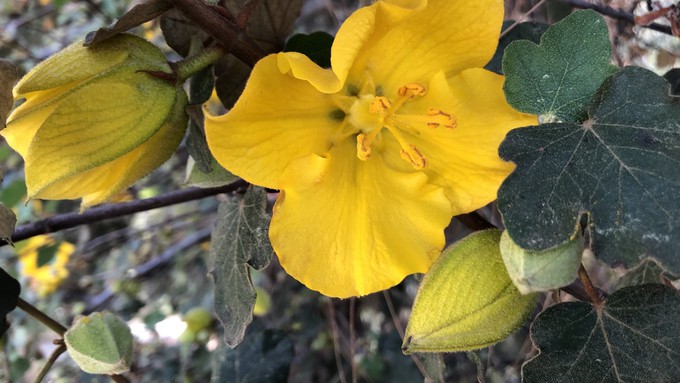
El Dorado master gardeners offer free workshop on biodiversity and sustainable gardening

Flannel bush (Fremontodendron californicum) is a very-low-water California native shrub that attracts bees and butterflies. Kathy Morrison
The choices we make in our gardens have greater impact than we may realize, say the UCCE master gardeners of El Dorado County. Find out how during a free in-person workshop, “Gardening for the Future.”
Set for 9 a.m. Wednesday, Jan. 10, the three-hour class led by master gardener Deborah Nicolls will be held at Cameron Park Community Center. No advance registration is required.
“Learn about sustainable gardening, permaculture, food forests, rewilding, and contributing to the Homegrown National Park,” say the master gardeners.
Made up of gardeners and backyards nationwide, the Homegrown National Park is a grass-roots effort to regenerate biodiversity by planting more native plants.
According to the organizers, this workshop will tackle some big problems with small acts. “Do you read the headlines about climate and the environment and worry about the future? Yours, your children’s, or grandchildren’s?” ask the master gardeners. “There are things you can do to help in your own corner of the world, even if all you have is a balcony, because every little bit does help.”
For example, growing plants that feed pollinators such as bees, butterflies and birds can help sustain wildlife amid an urban landscape.
Cameron Park Community Center is located at 2502 Country Club Drive, Cameron Park.
Details and directions: https://mgeldorado.ucanr.edu/.
Comments
0 comments have been posted.Sacramento Digs Gardening to your inbox.
Sites We Like
Garden Checklist for week of July 21
Your garden needs you!
* Keep your vegetable garden watered, mulched and weeded. Water before 8 a.m. to reduce the chance of fungal infection and to conserve moisture.
* Feed vegetable plants bone meal, rock phosphate or other fertilizers high in phosphate to stimulate more blooms and fruiting. (But wait until daily high temperatures drop out of the 100s.)
* Don’t let tomatoes wilt or dry out completely. Give tomatoes a deep watering two to three times a week.
* Harvest vegetables promptly to encourage plants to produce more. Squash especially tends to grow rapidly in hot weather. Keep an eye on zucchini.
* Pinch back chrysanthemums for bushy plants and more flowers in September.
* Remove spent flowers from roses, daylilies and other bloomers as they finish flowering.
* Pinch off blooms from basil so the plant will grow more leaves.
* Cut back lavender after flowering to promote a second bloom.
* It's not too late to add a splash of color. Plant petunias, snapdragons, zinnias and marigolds.
* From seed, plant corn, pumpkins, radishes, winter squash and sunflowers.